On Tuesday, Aug. 27, EA Sports released their first wave of ratings for the top 50 players in NHL 20. According to the EA website, overall attributes take into account individual abilities for both skaters and goalies.
Related: NHL 20 Player Ratings: 31-40
EA will be revealing the ratings for the top 50 players until the release of the full version of NHL 20 on Sept. 13. But for now, let’s see who made the list at Nos. 21 to 30 and analyze if their ratings are correct.
No. 30: Anze Kopitar, 89 OVR
Kopitar has been a constant for the Los Angeles Kings over the last decade and a half, but he’s also consistently been one of the league’s top two-way forwards. He had 22 goals and 38 assists for 60 points last season, but in 2017-18, he won the Selke Trophy for the league’s best defensive forward and finished third in Hart Trophy voting for the league MVP award.
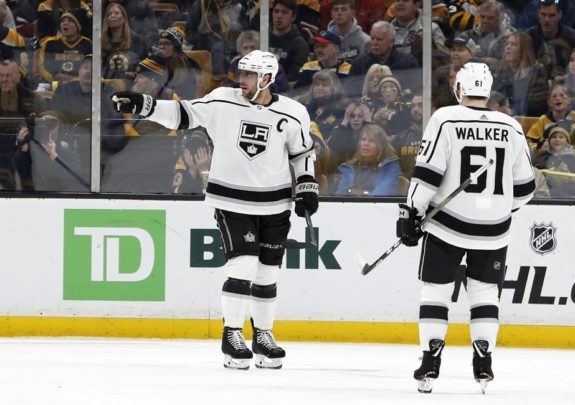
After his career-year in 2017-18, he was given a 90 overall rating in NHL 19. As an 89 going into NHL 20, I think that’s a fair rating. Both he and the Kings took a step back last season and both are hoping to turn things around in 2019-20. His passing and puck control attributes are down one point to a 91, but his face-offs went from an 83 to a 94. This was a reasonable increase since he had the highest face-off percentage of his career last season (55.1%). His offensive awareness went up to a 92 and, of course, his durability is up to an 89. An 89 overall is accurate to start the game, but if he can produce at the point-per-game levels he was at in 2017-18, he will be in the low-90s by season’s end.
No. 29: Ryan O’Reilly, 89 OVR
On both the personal and team levels, last year was a career year for O’Reilly. He tied his career high in goals (28), set a career high in points (77), won his first Selke Trophy and Conn Smythe Trophy, and he led the St. Louis Blues to their first Stanley Cup championship in franchise history. Not a bad year.
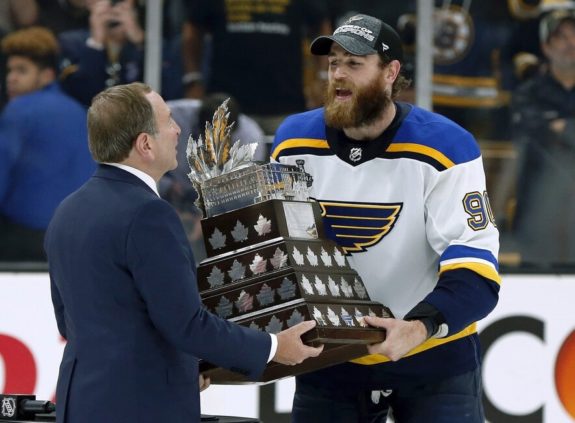
O’Reilly was an 88 overall in NHL 19, and while an 89 is a good upgrade, he should be rated the number he wears — 90. He’s getting an increase to many of his attributes, including all of his defensive metrics. Most notably, his face-offs went from an 88 to a 94, which might even be a touch too low. He’s consistently one of the best face-off winners in the NHL, and he was at 56.9% last season after the 2017-18 season when he was at 60%. O’Reilly finally had a breakout year, and I think EA should have rewarded the impact he had with a 90 overall rating.
No. 28: Vladimir Tarasenko, 89 OVR
Simply put, Tarasenko is one of the best pure goal-scorers in the NHL today. He’s had five straight 30-goal seasons and at least 60 points each, and he was a big reason the Blues won the Stanley Cup last year. He was second on the Blues in playoff goal scoring (11) and fourth in points (17).
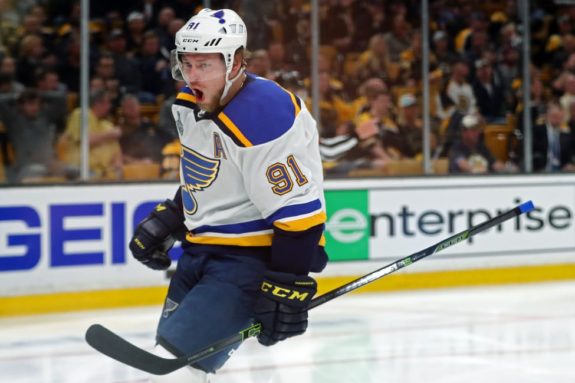
In NHL 19, Tarasenko was a 90 overall after posting 33 goals and 33 assists for 66 points in 2017-18. He had the same number of goals last season and two more assists for 68 points, all while playing nearly a minute less on average per game. He should be a 90 overall in NHL 20, just like O’Reilly. The only change to his attributes — go figure — is his durability, up from an 85 to an 87. He was a leader on a team that won the Stanley Cup and was a huge reason they turned it around in the second half. In the first 37 games of the season — essentially when the Blues were in last place — he had just 11 goals. In his last 39 games, he had 22 goals. He turned it on when the Blues needed it most and established himself even further as a leader, and I believe that warrants a 90 overall.
No. 27: Taylor Hall, 89 OVR
Hall was the 2017-18 league MVP, but his 2018-19 season was cut in half due to injury. However, he was still on a point-per-game pace with 37 points in 33 games. Had he not been hurt, it’s conceivable he would have sustained those numbers since he had 93 points in 76 games the season prior. No matter the case, he’s one of the top forwards in the game today.
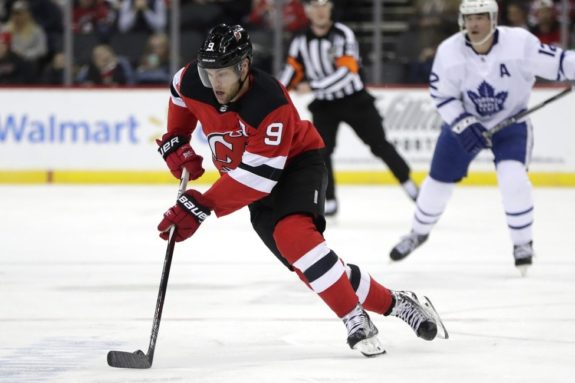
As expected, Hall was a 90 overall in NHL 19. EA appears to have taken into account his time missed due to injury, listing him as an 89 this year. The New Jersey Devils also missed the playoffs last season, and with that in mind, an 89 feels like the right number. His passing took a one-point knock, dropping to 91, but his acceleration went up one point to a 95.
Related: Cause of Taylor Hall’s Knee Injury Evaded Doctors for Months
However, his durability went from an 83 in NHL 19 to a 70 in NHL 20. That’s against the trend so far and likely a big reason for his setback in the upcoming game. If he’s healthy this season and producing like he has proven he can, he will be in the low-90s around the All-Star break.
No. 26: Tyler Seguin, 89 OVR
Seguin has had six consecutive seasons of 70 points or more, including 33 goals and 80 points last season. The 27-year-old has been one of the Stars’ top forwards since he arrived in Dallas in 2013 and has been consistently at or around 30 goals for most of his career.
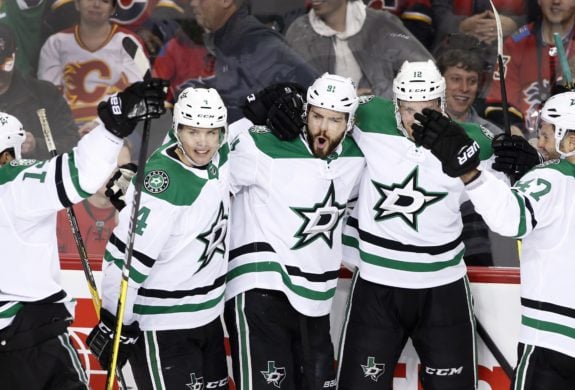
Seguin is an 89 overall this year but was a 90 overall in NHL 19. This seems a little strange since he helped lead his team to the second round of the playoffs with 11 points in 13 games and had his highest point total since his first season with the Stars. However, his face-offs rating also went up from an 80 to an 86, yet his face-off percentage was a full percentage point less than it was last season. With all of his other attributes unchanged from NHL 19, he should be a 90. He was just as good, if not a tad bit better than he was in 2017-18, and the only reason he might be a point lower overall is there were more players ahead of him in the top 50.
No. 25: David Pastrnak, 90 OVR
Pastrnak has established himself as a top producer in the league, especially when he’s on a line with Brad Marchand and Patrice Bergeron. He had 80 points for the second straight season. While only playing 66 games, almost all of his offensive statistics were up from 2017-18, and he’s one of the most creative forwards in today’s NHL.
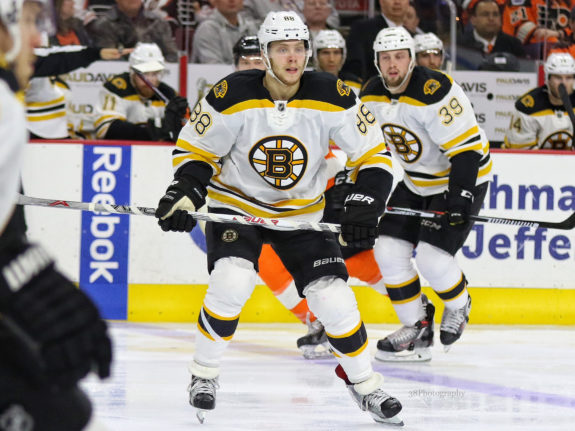
Pastrnak was given a 90 this season after being an 89 overall in NHL 19, and the increase was the right thing to do. His only attribute change was a decrease to his durability — 85 to 82 — which is also correct since he missed significant time. However, when he’s in the lineup, he is one of the best players on the ice and has proven to be able to produce every game. It’s possible he goes up from a 90, but starting as a 90 overall is perfect for Pastrnak.
No. 24: Brent Burns, 90 OVR
Burns has been in the Norris Trophy conversation for several years now with at least 60 points in each of his last five seasons. He led all defensemen in scoring with 83 points, and he was also averaging more than 25 minutes of ice time per game. He finished the season at plus-13 — his best rating since the 2013-14 season — and second in Norris Trophy voting to Mark Giordano.
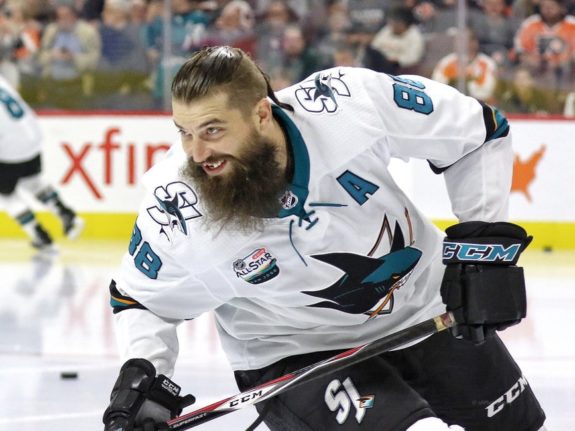
Burns was a 90 overall in NHL 19, and given how consistent he has been, a 90 for NHL 20 is the right call. The Sharks can count on him for production almost every night both at even strength and on the power play. The only attribute change is his durability, up from an 85 to a 90. He’s simply been consistent as one of the league’s highest-scoring defensemen and deserves a 90 overall.
No. 23: Sergei Bobrovsky, 90 OVR
Bobrovsky was the talk of the league last season, and most of the time it wasn’t because of his play but about where he would go in the offseason as a free agent. However, he won 37 games for the second straight year and had a career-best nine shutouts in the regular season. He was also stellar in the playoffs with a .925 save percentage (SV%) and 2.41 goals against average (GAA).
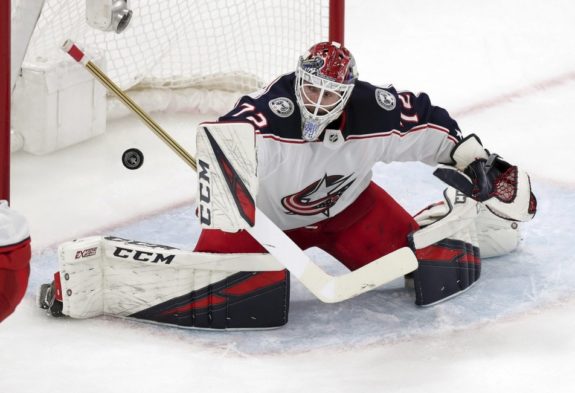
Like Burns, Bobrovsky was a 90 overall in NHL 19 and it’s the right number for him in NHL 20. Although his .913 SV% and 2.58 GAA were a little below his career marks, he was still one of the best goalies in the league night in and night out. All of his attributes are the same as last year’s game, and there’s really no reason to change them. It will be interesting to see how he does in his first season with the Florida Panthers in a new city and environment. If he’s about as good as he was last season, he will remain a 90 throughout most updates to the game, but he could get an increase if he starts getting back into the Vezina Trophy conversation.
No. 22: Tuukka Rask
Rask only started 45 games last season and won 27 of them, but he was still a leader for the Boston Bruins. He had a .912 SV% and 2.48 GAA, which are well below his career averages. However, he turned it on in the playoffs for a .934 SV% and 2.02 GAA. Many believed he could have won the Conn Smythe Trophy if the Bruins won the Stanley Cup.
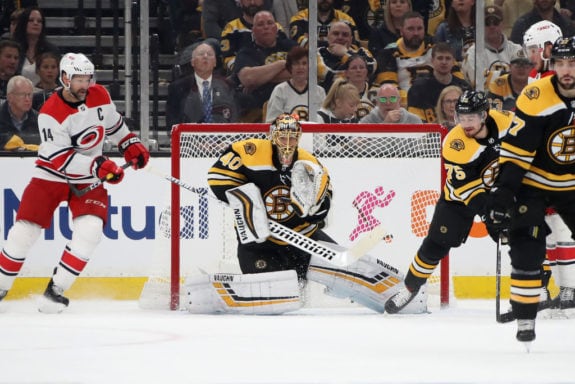
This is one of the harder ratings to assess because we know how good Rask was in the past, and his numbers last year in the regular season weren’t anything special. But, his numbers in the playoffs were video-game-like, and for that reason, a 90 is good. If EA went just by regular-season numbers, he likely would have been an 88 or 89 overall and possibly missed the top 50 list.
Related: Bruins’ Rask Has Silenced His Critics
His angles, glove low and stick low attributes are all down to a 90 in NHL 20, but he got a one-point increase to his agility attribute (92). Expect him to stay right around 90 for most of the season, unless he goes back to vintage Rask from 2013-14.
No. 21: Erik Karlsson, 90 OVR
In his first season with the San Jose Sharks, Karlsson had only three goals — the lowest of his career — and 45 points, the lowest total in any season which he has played at least 50 games. He battled injuries through much of the season and was adjusting to the Western Conference style of play, but he had no issues in the playoffs as he had 16 points in 19 games.
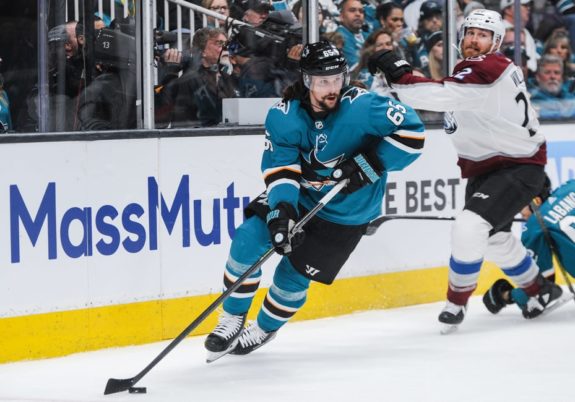
Karlsson has been, and likely will remain, one of the top defensemen in the NHL, and that’s why a 90 is the right rating. He was also a 90 in NHL 19, but the only change made to his attributes was his durability, which is now a 75 from an 85. His health was a concern last season and EA has taken that into account, but there was no reason to change anything else since he was essentially on pace in terms of production with the rest of his career. He just happened to get hurt and miss a good portion of the season. A 90 is right and if Karlsson can get back into the Norris Trophy conversation, he could be a 92 by April.